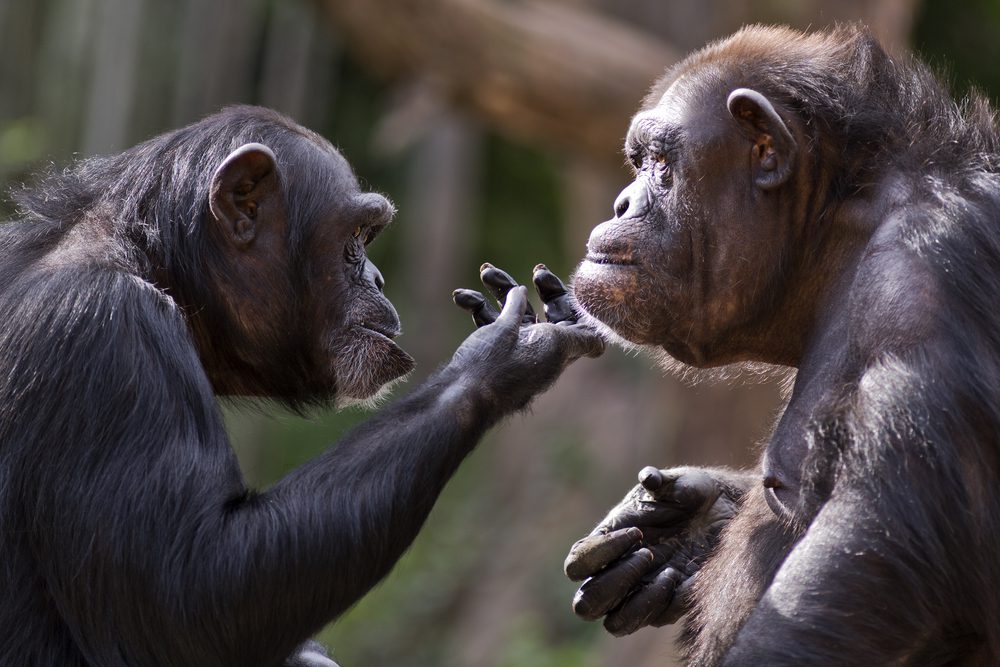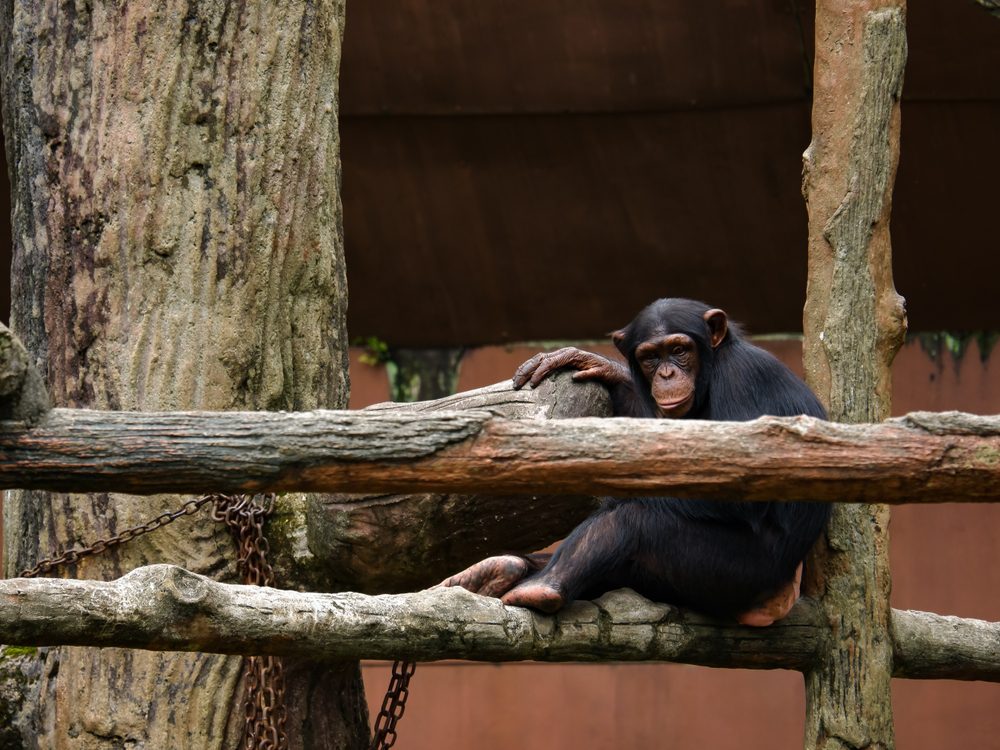What do we share with chimpanzees?
If you’re a firm believer in the Darwinian theory of Evolution (if you haven’t read it, here it is), then you also acknowledge the fact that there are plenty of traits you share with chimpanzees. Adding the theory of evolution to the fact that the latest findings have confirmed that there are many similarities between chimpanzees and humans.
They are basically our long-lost “cousins”! They laugh like us, smile in silence like us, love food and play, and are generally super aware of the fact that they can distinguish between fair and unfair. Also, they are capable of cultivating friendships, which is already more than a couple of people I know.
That’s why we decided to talk about all the things we share with chimpanzees, so you can be just as amazed by these wonderful creatures:

They play
Children aren’t the only ones who love spending hours and hours in a row having fun and playing. As a matter of fact, one of the things that kids share with chimpanzees is the joy of playing. Just like mini-people, chimpanzees love to spend many hours playing games.
According to ethologists and behavioral scientists, this type of activity has been defined as something that doesn’t have any clear or immediate benefit, and this can apply throughout childhood and youth, too.
On the other hand, scientists at the University of Pisa in Italy proved that social games, meaning those games that they cannot play alone but with other chimpanzees, enhance stronger social relationships and develop better cooperative attitudes.
Also, game modes and playmates automatically change as primates grow up. Among many other things, gamers are more cooperative in early childhood, which helps them become more competitive as young primates grow older.
They smile
Another thing we share with chimpanzees is the ability to feel joy in the same way. Chimpanzees can also smile in silence, laugh out loud, and burst out laughing. Moreover, they have a wide range of flexibility in communicating positive emotions, which so far has been believed to be one of their unique human features.
In fact, everything suggests that their facial expressions are directly linked to laughter, and it has been this way for our primate ancestors, too, long before humans evolved into homo sapiens. So far, the only smile that appears to be completely unique to us is the so-called Duchenne smile, which is a spontaneous expression.
We recognize it thanks to the involuntary contraction of the orbicularis oculi muscle (located around the eyes), which contractions raise the checks and form wrinkles around the eyes of the primate.
This is a genuine smile, and it is oftentimes linked to the activation of the brain’s limbic system (where the majority of emotions are generated), as was proved many years ago by French neurologist Guillaume Duchenne.

They are gourmands.
Given that they have zero access to supermarkets and restaurants, chimpanzees have no issue traveling any given distance to find their favorite food and ingredients in order to prepare the best feast. At least that was the main conclusion reached by the scientists from Harvard University.
It also showed that chimpanzees share with humans certain preferences for cooked food rather than raw, and they are also quite fascinated by the transformation process that happens when cooking food.
In fact, between the taste of a baked potato and a raw one, chimpanzees would rather eat the cooked one. In fact, they wouldn’t even blink. The only thing that’s missing in the grand scheme of things is that they are unable to control fire. However, if they are asked to use a heated pot or pan, it seems that chimpanzees can rapidly learn how to use it.
They are fully aware of the fact that they think
Another thing we share with chimpanzees is the fact that we both have meta-cognition, which is the ability to reflect on our own thoughts and mental processes. It has been recently proven by researchers from different US universities in “Cognition”, the well-known science journal.
According to the authors, chimpanzees are fully aware of what they do and don’t know, which makes them more or less confident in their own responses. Moreover, this fact can be seen in their behavior, too, and it’s partly one of the reasons why they are able to make such intelligent decisions.
In my opinion, the fact that chimpanzees have meta-cognition is probably one of the most relevant signs that we have many things in common and proves even further the whole Darwinian theory of Evolution. Otherwise, what other animals proved they were aware of their own thoughts?
They are fair and moral.
Another wonderful thing you might share with chimpanzees (although we can’t say it applies to all humans) is that you both have a sense of right and wrong. Just like us, chimpanzees can discriminate and decide what behavior is appropriate or not, especially if it affects young and baby chimpanzees.
In a recent study carried out by the University of Zurich and later published in the journal “Human Nature”, it was evident that when a chimpanzee sees a baby being harmed or even killed by another member of its own species, it instantly reacts with a lot of indignation and anger.
You’d be surprised to find out that this phenomenon doesn’t happen in cases of violence among adult monkeys. Moreover, the study shows that these primates have a great sense of morality that’s very similar to ours.
Interesting fact: A couple of US biologists played “Ultimatum” with chimpanzees, which is an experimental economics game made to show how choices regarding fairness and equality criteria could take precedence over benefits. What these biologists managed to prove is that primates share our aversion to injustice.
To be more specific, chimpanzees tend to choose fair and egalitarian offers, and they only take these kinds of offers from their peers. As the authors of the research explained, “Chimpanzees are extremely cooperative in the wild, and they are also sensitive to the equal distribution of rewards, which clearly shows an evolutionary advantage, given that cooperation benefits them.”
They have a great numerical memory span.
I know that the general belief is that humans outperform chimpanzees in most cognitive functions, but that’s not true. Another thing you share with chimpanzees is a wonderful numerical memory span.
Moreover, a 5-year-old chimpanzee seems to be more capable of remembering numbers displayed on a screen than an adult human; at least that’s what the latest experiment conducted by the University of Kyoto, Japan, showed.
Scientists believe that they have an eidetic or photographic memory, which basically means they have the ability to recall in close detail what is seen and heard, an ability that is more common in human children but slowly declines with age.
They wage war.
Out of all the world’s species, it seems that humans and chimpanzees are the only ones who engage in coordinated attacks on other members of their own species. In short, neither we nor chimpanzees have any issue starting wars.
As it turns out for the primates, attacks aren’t caused by interference with humans, which was seen for a long time as the main reason why the primates feel the need to become aggressive.
They cultivate friendship.
The last thing that you share with chimpanzees is the ability to cultivate friendships. As it turns out, they also believe that “whoever finds a friend finds a treasure”. Chimpanzees are always surrounded by great friends, appreciating and looking for other individuals who spend time with them but who also help them in case there’s any confrontation.
If you enjoyed reading this piece, then we also recommend: Did The US Government FAKE the Moon Landing?! 6 Theories Debunked














